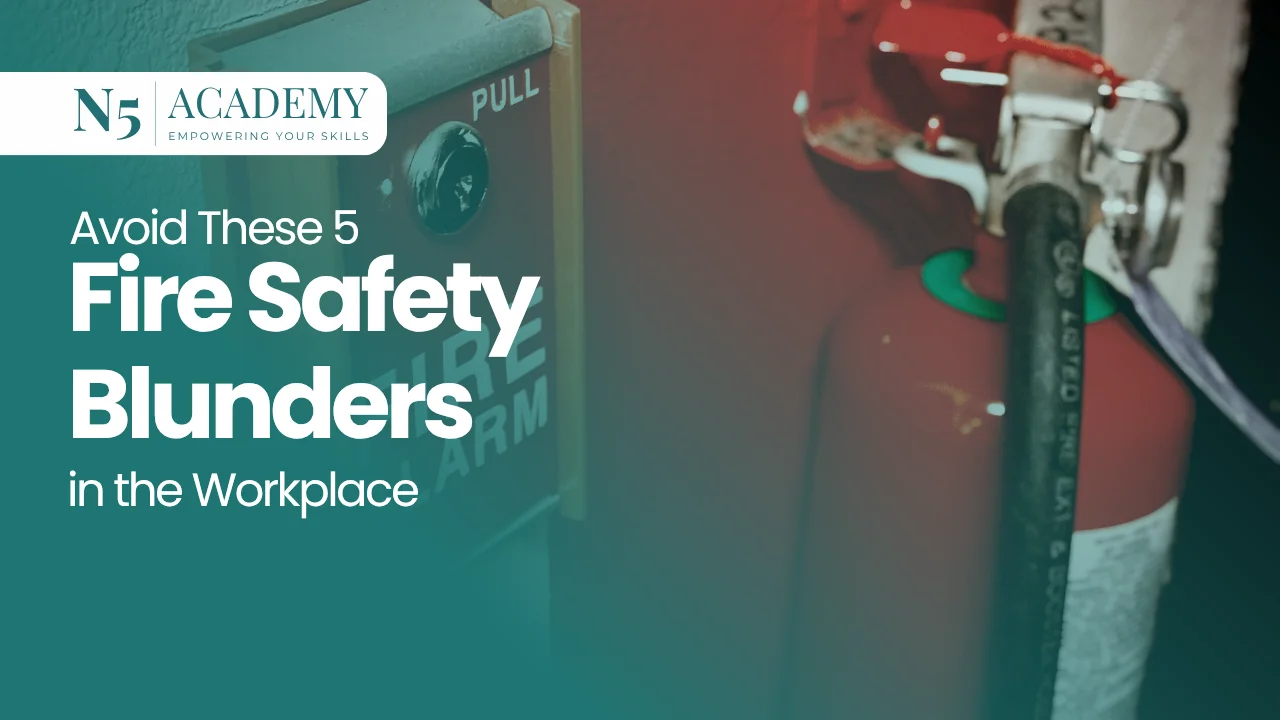Keeping your workplace safe from fire is crucial for protecting lives and your business’s future. However, many UK organisations still ignore basic fire safety rules. Issues like broken alarms and untrained staff can quickly turn small problems into major disasters.
Even careful employers can develop bad habits or underestimate fire safety’s importance. Whether you run a small store or a large office, ignoring fire safety can lead to serious consequences, including loss of life and severe damage to your business.
Fire safety is vital for a secure and legally compliant workplace in the UK. Sadly, many employers make mistakes that put their employees and businesses at risk. Below, we highlight the five most common fire safety mistakes in the workplace and offer practical tips on how to fix them.
Neglecting Regular Fire Risk Assessments
A fire risk assessment is not a one-time job; it is required by law under the Regulatory Reform (Fire Safety) Order 2005. Many businesses don’t keep it updated because they forget, lack resources, or don’t see its importance.
Why It Matters
- Fire risks change as your business grows. New equipment, layouts, or staff can create new dangers.
- Regular assessments help find risks before they become serious problems.
- A clear assessment proves you follow UK laws and can help you avoid large fines.
Common Oversight
- Forgetting to review after renovations or moving.
- Not writing down what was found and what was done.
- Not designating someone to manage the whole process.
Tip: Review your fire risk assessment every year or after major changes at work. Work with your health and safety team to check how well the plan is being followed.
Need help? Our fire and safety course in the UK teaches you how to perform and respond to fire risk assessments.
Skipping Proper Employee Fire Training
Training your team is crucial to prevent panic and enable quick action during a fire. A confident and prepared team can help control fires and ensure smooth evacuations, reducing risks and minimising harm.
What Can Go Wrong?
- Employees might not know where the fire exits are.
- Staff might misuse fire extinguishers or raise the alarm too late.
- Untrained people may panic or ignore safety rules.
Why Fire Safety Training Is Vital
- It cuts down on confusion and panic in emergencies.
- Trained staff can prevent small fires from getting worse.
- It helps everyone remember escape routes, assembly points, and who to tell about incidents.
At N5 Academy, we provide fire marshal training courses that help employees learn how to respond quickly and safely in emergencies. You can take these courses online or in person, and they work for any business.
Bonus Tip: Include basic fire safety in your new employee orientation and review the information every 6 to 12 months with short internal sessions or toolbox talks.
Blocking Fire Exits and Escape Routes
Using fire exits as storage or blocking escape routes with furniture is a dangerous mistake. This often occurs in busy places with limited space, like stockrooms or kitchens.
What Happens If You Block an Exit?
- Blocked paths during a fire can waste precious seconds or even cost lives.
- Firefighters might struggle to reach the building.
- Your business could face legal trouble for not following fire safety rules.
How to Prevent It
- Check escape routes regularly.
- Make sure emergency exit signs are bright and easy to see.
- Run fire drills that mimic real situations.
- Put up clear reminders near exits to prevent blockages.
Tip: Include exit routes in your weekly health and safety checks. Use mobile audit apps to gather and save evidence.
Improper Use and Maintenance of Fire Equipment
Having fire extinguishers and alarms is important. But knowing how and when to use them is essential. Many businesses also forget to maintain these tools, making them useless when needed most.
Common Mistakes
- Fire extinguishers are not serviced every year.
- Staff do not know the types of extinguishers and how to use them.
- Alarm systems are not tested often.
- Emergency lighting does not work during a blackout.
Best Practices
- Check and certify all fire extinguishers every year.
- Add a fire equipment check to your monthly safety audits.
- Provide refresher training on using different types of extinguishers.
- Record all inspections and tests in your fire safety log.
Remember, our online fire marshal course at N5 Academy offers hands-on training in using and maintaining fire equipment.
Failing to Assign Trained Fire Marshals
Many businesses lack a trained fire marshal or assign the role without proper training. This increases the risk during emergencies.
Why You Need a Trained Fire Marshal
- Fire marshals lead evacuations and work with emergency services.
- They make sure everyone follows UK fire safety laws.
- They are the main contact for reporting problems and enforcing fire safety rules.
Responsibilities of a Fire Marshal
- Fire Safety Checks: Regularly check fire safety equipment.
- Evacuations: Manage evacuations during drills or emergencies.
- Reporting Issues: Report any problems with fire equipment or procedures.
- Record Keeping: Keep records of training, drills, and incidents
N5 Academy offers a fire and safety course in the UK that trains your staff to handle emergencies confidently and legally. We teach evacuation leadership, how to spot hazards, communication strategies, and emergency coordination.
Overlooking Electrical Hazards
Electrical faults often cause workplace fires in the UK. Many people forget to regularly check sockets, wires, and appliances. Without proper maintenance, an overloaded plug can result in serious problems.
Danger Signs
- Overloaded power strips and extension cords: Avoid using too many devices on one power strip or extension cord.
- Frayed wires or sparking plugs: Check for damaged wires or plugs that spark.
- Equipment running hotter than normal: If your devices feel unusually hot, turn them off and unplug them.
- Flickering lights or tripped circuit breakers: If your lights flicker or breakers trip often, investigate the electrical system.
How to Stay Safe
- Schedule PAT every year.
- Train staff to report unusual smells, sparks, or electrical problems.
- Do not daisy-chain extension leads.
- Unplug devices when not in use.
Tip: Keep flammable items away from power outlets and electrical equipment. Have a staff member check these areas visually every week.
Lack of Fire Drills and Evacuation Practice
Don’t assume your staff will know what to do in a fire. Without practice, they may panic. Drills show weaknesses in your evacuation plan and offer important learning experiences.
The Problem
- Fire drills are often hurried or missed entirely.
- Evacuation procedures are old or confusing.
- Employees do not take drills seriously because they are not engaged.
The Fix
- Run fire drills at least twice a year.
- Include your fire marshal and assign staff to watch different exits.
- Review each drill and update procedures as needed.
- Use floor wardens to manage crowd flow and assist those who need help.
Practice builds confidence. Confident employees can save lives. Record every drill and share the reviews with the team afterwards.
Improper Storage of Flammable Substances
Some materials, like cleaning agents, paints, and aerosols, can catch fire easily if not stored properly. This is especially important in warehouses, labs, or businesses that use solvents and chemicals every day.
What Can Go Wrong?
- Poor ventilation causes harmful vapors to build up.
- Heat or sparks from machines can start a fire.
- Containers might leak or be left open.
Best Practices for Storage
- Store flammable items in special cabinets that allow airflow.
- Keep them out of direct sunlight and away from heat.
- Label all dangerous substances clearly.
- Use trays to catch any leaks.
Bonus Tip: Keep Material Safety Data Sheets (MSDS) handy for all flammable materials. Go over safety procedures with your team every month.
Not Keeping Fire Safety Policies Up to Date
Old policies might not match your current workplace. As your team, tools, and office layout change, your fire safety plan should change as well.
Outdated Policies = Increased Risk
- Staff may not know the new fire exit procedures or equipment.
- Risk assessments might not reflect current operations.
- Emergency contact lists may be old.
What You Should Do
- Review fire safety policies every year.
- Share updates in company emails or meetings.
- Make sure new procedures are included in your fire safety training.
- Keep a log to track changes and their dates.
Need help updating your policies? Join our fire marshal training courses for expert advice specific to your industry.
Fire Safety is Everyone’s Job
Fire safety at work isn’t just up to management; everyone has a part to play. Employees can make a big difference by reporting hazards and staying calm during drills.
Encourage open talks about fire risks and involve employees in updating policies and evaluating drills. An engaged workforce is your best asset for fire safety.
If you need guidance, N5 Academy can help. Our online fire marshal course equips your team with the skills and confidence to handle fire emergencies. Let us help you create a safe and prepared workplace.






